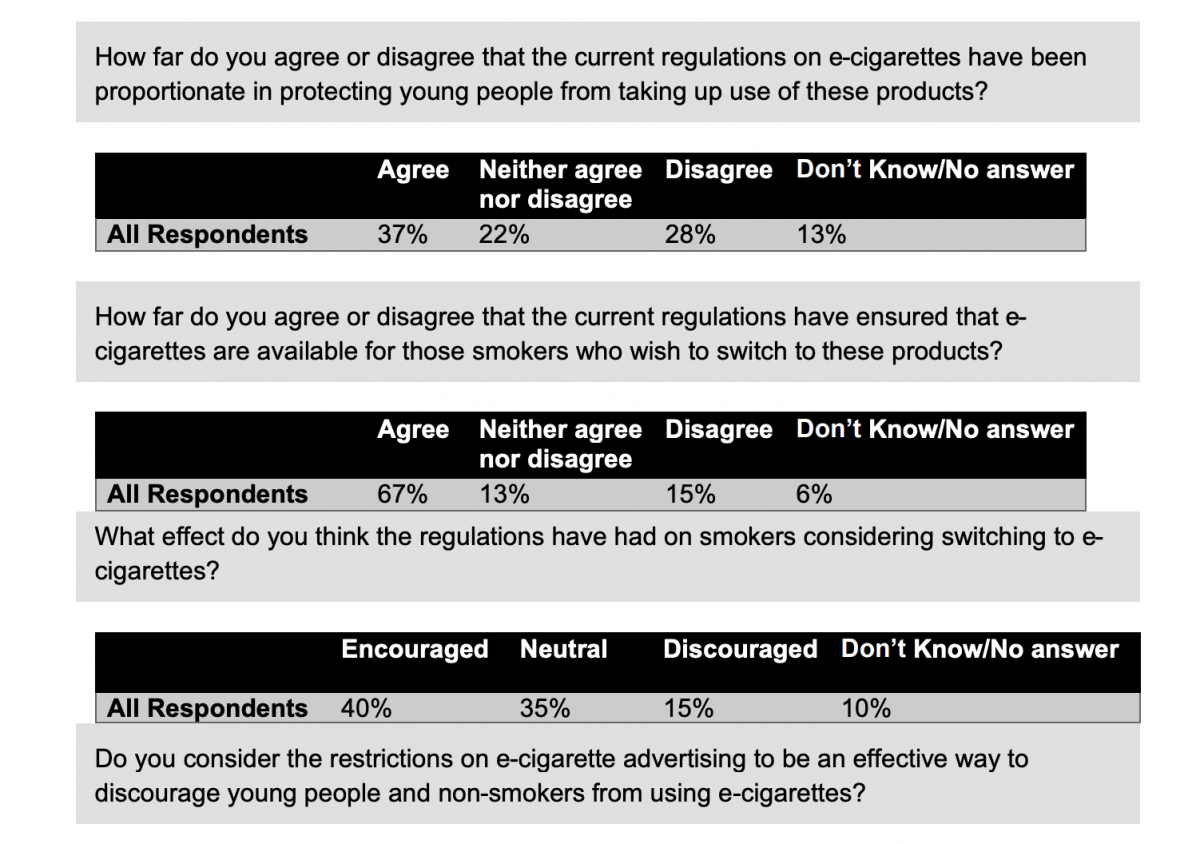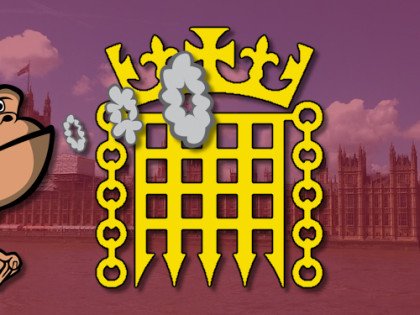The consultation received 5,254 responses from a range of different stakeholders, identifying themselves as individuals, non-governmental organisations (NGOs), businesses, public sector bodies, and others.
Broken down, the submissions were received from:
- 5110 Individuals – 97.3% of respondents
- 32 NGOs – 0.6% of respondents
- 58 businesses – 1.1% of respondents
- 24 public sector bodies – 0.5% of respondents
- 30 other – 0.6% of respondents
The authors of the review document say: “Common themes from those who felt the regulations were too severe were that both tank and refill bottle sizes should be bigger, and some suggested the allowed nicotine strength of e-cigarettes should be increased.
“Amongst respondents that felt they should be more severe it was suggested that the packaging encourages (young) people to use e-cigarettes, and that allowed nicotine strength should be decreased.
“On helping smokers switch to e-cigarettes, many responses suggested that tank size, refill bottle sizes, and nicotine strength should be increased.
“Related to restrictions on advertising, it was suggested that to help smokers switch, the restrictions on advertising should be relaxed to increase the awareness of the positive health benefits of switching. However, in regard to young people, many felt that the restrictions on e-cigarette advertising were working to discourage them from using e-cigarettes.”

The document also details how the introduction of vape legislation effected businesses. It found:
- The introduction of vape legislation did not impact sales volumes negatively
- Introducing warnings on packaging meant old stock had to be disposed of at cost, resulting in losses for vendors
- Shops where vape products sell well thought smokers switching to vaping was positive because they earned more profit per item: “There’s a lot more mark-up on them, so we can make more on that. So, if the likes of our cigarette smokers move across to e-cigarettes, then it’s a win-win for us.”
- Places where vapes do not sell well feel that consumers would rather go to specialist stops for their ecig kit
- Businesses feel customers can get around e-cigarette regulations easily. This included purchasing online, or making their own e-liquids: “You can still buy the big tanks online, you can still buy the great big bottles of oil online, you know?”
Consultation summary of views about vaping
The document states: “Some stakeholders raised concerns that the nicotine strength limits were not high enough to help some smokers switch permanently to just e-cigarettes and help the government achieve its Smokefree 2030 ambition. In addition, many from industry, other organisations and vapers felt the tank size limits, and bottle sizes should be increased as they were inconvenient.
“In terms of the TRPR requirements for e-cigarette warning messages, a study suggested that they may deter smokers from switching to e-cigarettes.
“At the same time, some stakeholders thought the non-nicotine vaping industry should be regulated in the same way as e-cigarettes. This would improve standards and consumer safety, and ensure regulation was coherent. Some responses also said the regulations did not go far enough on e-cigarettes in terms of restricting the packaging and descriptor names to protect youth from using these products.”
Consultation conclusions for vaping
“Responses to the consultation varied, with respondents suggesting amendments to e-cigarette packaging to promote them to be less harmful than smoking, increase bottle sizes of nicotine liquid, tank size increases and nicotine strength. With others wanting a strengthened TRPR to have for example more powers over packaging designs and colours to deter youth use.
“If the regulations were relaxed, there would be an expected decrease in the health benefits seen from the TRPR.
“The regulations, although seen as strong given the low youth use of smoking and e-cigarette use, still has areas to strengthen not covered under these regulations to help the 7 million UK smokers quit and deter future generations from entering smoking.”
Recommendations for changing the legislation on vaping products
“Overall, it is DHSC's position that the evidence presented above provides a strong argument for the retention of the regulations. There are some areas of tobacco and nicotine products that the regulations did not cover, with some suggesting they should do, for example, including non-nicotine vapes and nicotine pouches under the TRPR regulatory framework.
“In addition, some argue that TRPR should be strengthened further to include additional measures which restrict tobacco use and prevent youth and non-smokers from using e-cigarettes. This needs to be carefully balanced in supporting efforts to enable adult smokers to switch to e-cigarettes as a less harmful alternative.
“Despite these suggested amendments, they do not provide evidence of significant issues with the regulations and removing them would likely result in all the health benefits being lost. The Government will consider the suggestions for changes to the regulations, and a range of other regulatory reforms, to help support its Smokefree 2030 ambition.”
So, despite the clear benefits of relaxing the cap on nicotine strength, 2ml tanks, and 10ml bottles, the Department of Health and Social Care is still not recommending the Government changes them. Time will tell if common sense will prevail.
References:
- Post-Implementation Review of Tobacco Legislation - https://assets.publishing.service.gov.uk/government/uploads/system/uploads/attachment_data/file/1063222/the-tobacco-and-related-products-regulations-2016-post-implementation-review-web-accessible.pdf
Photo Credit:
Photo by Shreyas Sane on Unsplash
Dave Cross
Journalist at POTVDave is a freelance writer; with articles on music, motorbikes, football, pop-science, vaping and tobacco harm reduction in Sounds, Melody Maker, UBG, AWoL, Bike, When Saturday Comes, Vape News Magazine, and syndicated across the Johnston Press group. He was published in an anthology of “Greatest Football Writing”, but still believes this was a mistake. Dave contributes sketches to comedy shows and used to co-host a radio sketch show. He’s worked with numerous start-ups to develop content for their websites.
Join the discussion
Parliament Fears Two
The Department for Environment, Food and Rural Affairs faced questions from a Conservative MP and, oddly, a member of the Department for Environment, Food and Rural Affairs
Harm Reduction For The Rich
The United Kingdom risks becoming a harm reduction country only for the wealthy, according to Michael Landl of the World Vapers’ Alliance
Scotland Announces Single-Use Vape Action
A ban on the sale and supply of single-use vapes in Scotland is due to come into effect on 1 April 2025, under proposed legislation published today
Parliament
Andrea Leadsom has been quizzed by Rupa Huq and Derek Thomas about the promotion of vaping and support to those who want to quit






-listing400.jpg)




